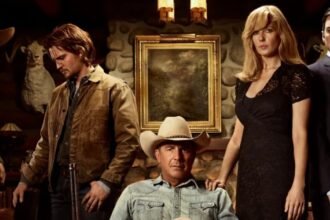The basic premise follows the 16-day, cross-country road trip between comedian and actor Will Ferrell and longtime friend and fellow Saturday Night Live alum Harper Steele. After nearly 30 years of friendship, Steele came out as a trans woman to Will and Harper two decided to embark on the journey to rediscover their friendship, and Steele could rediscover the country and locales she loves — this time as herself.
The surprises come by way of run-ins with everyday people from all walks of life and comedy legends alike (think Tina Fey, Seth Meyers), making for a medley of interactions heartbreakingly emotional and hilariously relatable, but above all, unflinchingly honest. But despite all of that, and the other little twists and turns along the way (who knew there were so many bad flavors of Pringles out there?), Steele and Ferrell say perhaps the biggest surprise was themselves.
Read More: Emma Coronel
“The big surprise was how deep Will and I were able to go, because we’ve had lots of personal conversations and lots of funny conversations, but we took it to a different level,” Steele tells Entertainment Weekly. “And I don’t think we went into it thinking that that would happen.”
:max_bytes(150000):strip_icc():format(webp)/Will-and-Harper-092524-adeb2b5777ed444fb5826375aa6d4eed.jpg)
Will and Harper on all those SNL cameos in Will & Harper and the ‘intensely funny’ stuff they had to cut
Adds Ferrell, “Just the exercise of spending six to eight hours a day in a car, and somehow we never were at a loss for something to talk about. And I think we both definitely thought that we wouldn’t have bet on that happening. We probably would’ve been like, well, of course it’s just going to be natural that someone wants to take a nap. But it was just… fun.”
Of course, it wasn’t all fun. As Steele says in the film, she wanted to do the road trip in part because she loves America so much, but isn’t sure if it loves her back. And while there are a lot of moments of love and tolerance and acceptance to be had, the doc also doesn’t shy away from difficult conversations or learning opportunities between her and Ferrell, or uncomfortable run-ins with strangers or even downright hateful comments from them.
It was important to show all of this, Ferrell says, because, “fear is fueled by ignorance, and if we can lessen some of the ignorance, then I think it lowers the temperature on the fear or the absolute rejection. It doesn’t need to be that extreme.”
This conversation took place the day after the Sept. 10 presidential debate between Donald Trump and Vice President Kamala Harris, in which the former president falsely stated, “Now she wants to do transgender operations on illegal aliens who are in prison.” This erroneous word salad — which was widely mocked on social media afterwards — and the rhetoric of the debate in general was top of mind for Ferrell and Steele the next day.
:max_bytes(150000):strip_icc():format(webp)/Will-and-Harper-092524-2-ae27f45246b74580ac3b9873ad0eb375.jpg)
Will Ferrell says dressing in drag for laughs on SNL is something he ‘wouldn’t choose to do now’
“I think there’s a number of people who show up in the doc who express — I keep talking about this — I think we’re all dying for just acts of civility. We watched the debate last night and it’s like, I think we’re just tired of whatever side you’re on,” Ferrell admits. “And I think this [film] is encouraging to people that there are discussions to be had out there, and that people are willing to listen.
And it doesn’t mean that there isn’t… yes, trans people, queer communities still face a lot of hate. But I think we’re showing that there’s still space out there for people to evolve. And also too, that just expressing advocacy for our friends, regardless of what they’re going through or experiencing, is another potential takeaway from watching this.”
Citing a statistic presented to production during research for the documentary, Greenbaum added: “Seventy percent of people don’t directly know or think they know a trans person. So they get what they get from the media, from politicians. So if they don’t know anyone, now they’ll know Harper. And she’s funny and charming and complicated and just all the things you would want to represent the human side of a trans person’s experience. Then maybe the politics will follow.”
The goal, Steele says, is not for people to love her, specifically, more. “I want the film to sort of point a direction towards a way to have this conversation,” she says. “We have a lot of these people who don’t like trans people who have queer people in their families one way or the other.”
Want more movie news? Sign up for Entertainment Serial. free newsletter to get the latest trailers, celebrity interviews, film reviews, and more.
Pointing at Ferrell, who was seated beside her for this interview, Steele adds, “And that would be a great service, if they could watch this funny person show them a roadmap on how to engage with that person. I don’t know if it’s going to change a lot of hearts and minds, but I hope it does.”
An “error” of judgment made by Will Ferrell while filming his newly released documentary has been explained by the film’s director, who opted to include the uncomfortable moment in the finished product.
In Will & Harper, which was released on Netflix on Friday, Saturday Night Live (SNL) alum Ferrell is seen going on a road trip with his friend and longtime collaborator Harper Steele, who two years ago came out as a transgender woman at the age of 61.
When former SNL head writer Steele informed Ferrell, 57, the Los Angeles-based Elf star proposed that his friend leave her New York base to join him on a cross-country road trip, where they could talk about life and film it.
The resulting production saw the pair make their way to a Texas steakhouse, where Ferrell took a shot at raising laughs by donning his Sherlock Holmes costume from the 2018 comedy movie Holmes & Watson.
However, as Steele and Ferrell sat opposite one another to partake in a testing steak-eating challenge, the mood in the room shifted as patrons directed their attentions to Steele. As photos of the pair at the eatery were shared on social media, a deluge of disparaging comments followed.
The stunt had backfired, leaving Steele at the hands of detractors, who expressed anti-transgender sentiment.
The following morning, Ferrell shared that he had let his friend down by inadvertently making her a target for negative attention. Josh Greenbaum, the documentary’s director, opted to allow this particular part of their road trip to play out for viewers, rather than relegate it to the cutting room floor.
“That was a learning point, certainly for Will, that not all attention is good attention, particularly for those in the trans community,” Greenbaum told U.K. newspaper The Guardian.
“It was an unforeseen error, but I didn’t want to then sweep that under the rug and not include it. A huge part of the trans experience is that there is just a massive amount of hatred, a lot of it online.”
The prospect of being the first trans person that a number of Netflix viewers will get to know—albeit through TV screens—was a factor that Steele told The Guardian she “wasn’t really thinking about.”
“That would be weird,” she said. “They gave us some fact that more people have said they’ve seen an alien than have seen a trans person, which I find it a little hard to believe. I’m travelling across America. Every family has queer people, whether they acknowledge it or not, and the trans community is a part of the queer community. I like to affirm that.
“So maybe it’s possible people don’t have trans people in their lives. But I believe they will,” she added.
Ferrell approached the film—in which he gives the spotlight over the Steele—without an agenda, explaining that they approached the project with the mindset that it would “just be whatever it’s going to end up being.”
“So if it happens to be funny, if none of it happens to be funny, it will find its way,” he told The Guardian. “It was great to not have, in a conventional sense, a shooting day where you’re hoping this scene works, or wondering why it isn’t working.
“We made it all the way to Santa Monica, and Josh said: ‘I think that’s a wrap.’ And then we walked back to our car going, ‘I don’t know if there’s a movie there. But that sure was fun.'”

Did you ever hear the one about the “Saturday Night Live” writer who came out as transgender to his friend Will Ferrell, and they took a road trip across the United States to see how the country reacts to transgender people? You haven’t? You should, because it’s pretty funny. And in the end, it’s no joke. It takes the form of a documentary called “Will and Harper.” It’s on Netflix.
Though I suspect the folks behind it would dislike this term, the movie is pretty unabashedly a teaching tool aimed at a country where maybe a third of the electorate not only has deep animosity towards transgender people but is being fed hate rhetoric about them daily. It’s affecting in its low-key way, thanks to the chemistry of its title personalities. And it works as the kind of buddy comedy Ferrell might’ve starred in at one time (and would probably have had to apologize for later). After all, buddy comedies with former “Saturday Night Live” cast members aren’t known for their sophisticated grasp of nuance.
Harper is Harper Steele, formerly Andrew Steele. She was at “Saturday Night Live” before Ferrell got there and championed him as a gifted comedian even though nobody there thought a lot of him when he was starting out, which became the basis for a beautiful friendship. During the pandemic, Ferrell received an email from Steele that read simply, “I’m old now, and as ridiculous and unnecessary as it may seem to report, I’ll be transitioning to live as a woman.”
Ferrell was stunned because, as he puts it, “Andrew was an Iowa-born, 501 jeans, shitty beer, hitchhiking type of guy, basically a lovable curmudgeon with a super-weird, creative sense of humor”—which, as the movie shows us (in a way that corrects Ferrell’s perceptions without being strident about it) is a misperception about the sorts of people who transition.
To its credit, director Josh Greenbaum (“Barb and Star Go to Vista Del Mar”) ultimately weights the scales of interest more towards Harper Steele than Will Ferrell. This is not so much a movie about a straight and cisgender-identifying person learning how to accept his old pal in a new package. It turns Ferrell into an audience surrogate who has traveled the road of understanding and acceptance a long time ago and is reenacting it for the cameras, in a way.
Ferrell says that after receiving the email, he wondered, ““How long did she feel this way? What made her keep this in for so long?” and says that in the immediate aftermath of the news, their friendship was in “uncharted waters,” but that feels like an exaggeration for storytelling’s sake. It’s pretty clear from the way these two interact on camera, as well as some other details, that there was never even a slight chance that Ferrell would reject Steele or even have a lot of issues to overcome.
Steele’s concerns are more pressing. In fact, they are quite literally life-or-death. Steele is from Iowa and says she “loves the United States, but I just don’t know if it loves me back right now.” She presents herself to the world differently than before but still loves the same stuff, including, in her words, “shi–y bars” and “truck stops” and the parts of the country where a body could disappear and nobody would ever find out.
This concern becomes immediately clear as the two discuss taking a road trip. The main concern is safety. Not so much the safety of these two within the context of a real-life road movie: they’re traveling with a camera crew, one of them is Will Ferrell, and presumably, the production got clearance and put signs up saying, basically, “We’re making a movie, you give your permission to be in it when you go inside this establishment,” whether the establishment is the arena where the Indiana Pacers play or one of the aforementioned dive bars.
Steele gets misgendered, and there’s an unfortunate encounter at the game with the governor of Indiana, who acts friendly but turns out to be a big anti-trans person who signed a bill denying teenagers gender-affirming care.
No, the concern is more about what is already happening across the United States and around the world when the people involved aren’t famous and don’t have multiple cameras on them at all times, collecting material for a Netflix documentary. “Walking past all those bros in a bro-ey environment has been the hardest part of my transition,” Steele admits.
It all turns out pretty well in the end, though. And, of course, that’s the point of the exercise: to show that none of this is as big a deal as bigots make it out to be and that if Will Ferrell can be 100 percent supportive of his friend Harper, there’s no reason why the same scenario can’t repeat itself everywhere.













